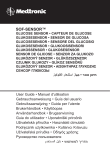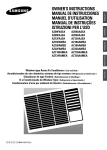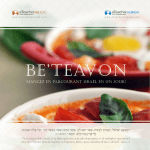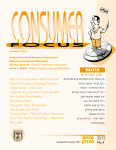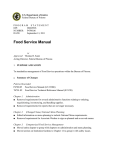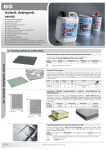Download 2012 No.3
Transcript
Summer 2012 Produced by the Publications Department Ministry of Immigrant Absorption Ida Ben Shetreet - Director, Publications Department Laura L. Woolf - Director, English Language Publications Purchasing a Refrigerator Care and Use of Microwave Ovens What to Look for in a Dishwasher Olive Oil- A Classic Ready Spagetti The National Food Control Service How to Choose a Water Purifier Supermarket Saving Recipes for Fun Household Pests Resources Updated for Summer 2012 1 2012 No.3 A Word from the Editor I would first like to say how gratified I was at the response to the first two issues of ConsumerFocus. Thank you to everyone who ordered the magazine, and to those of you that sent in the feedback form. Extra-special thanks to the folks that were kind enough to write or telephone to tell me how much you enjoyed ConsumerFocus. Some people even shared some of their own consumer tips; I’ve reprinted a few of them in this issue. It is a delight and a privilege to write for such an appreciate audience! In this third issue, the focus is on consumerism in the kitchen. You’ll find tips on saving money at the supermarket, and advice from the Israel Standards Institute about dishwashers, microwave ovens, gas stoves, and water purifiers. “Baduk” magazine shares its research into olive oil and instant pastas. We take a look at a few ways to deal with that ongoing fact of Israeli life…household pests. And finally, just for fun, some quick and easy recipes for favorite Israeli foods. As always, a resource guide is included at the back. Best wishes for a healthy, happy, and economical holiday season! Laura Woolf Editor, ConsumerFocus Magazine 2 SMART SHOPPING Money to Burn Purchasing a Gas Stove Some Tips on what to look for from the Israel Standards Institute Your stove is, naturally, one of the most important items in your kitchen. If you are in the market for a stove, you’ll find a wide variety available. Some stoves are electric (“teken” 900,) while some models combine electricity and gas (“teken“ 1049). Many gas stoves are sold as an independent unit; others are combined with an oven. You can also choose to have a stove built into your overall kitchen system. The experts at the Israel Standards Institute advise the following points when purchasing and maintaining a gas stove: • Look for models that have a tav teken. • Never install a stove in proximity to flammable substances such as wooden countertops. • Make sure that a qualified workman licensed by the Ministry of Trade, Industry, and Labor carries out the installation. • Ask the installer to check out the stove’s insulation before you use it for the first time. Make sure that the gas point for the stove is located where you can reach it. • Only install the gas point once you have purchased the stove, and you have reviewed the measurements and specifications. • Be careful to prevent cleaning materials from getting into the gas nozzles. • Be sure that the safety switch is always off when you are not using the stove. Freeze! Don’t Purchase a Refrigerator Before You Read This! A refrigerator is a major investment. You will use your fridge every day, several times a day, for many years to come. As the Israel Standards Institute points out, before purchasing a refrigerator, it is important to be aware of what to look for and what to avoid. The Israeli market carries both domestic and imported models. What you choose is mainly a matter of personal taste, as many models share the same features. Be aware, however, that replacement parts on Israeli models are often easier to obtain. The law requires that all Israel-manufactured models conform to the Israeli standard (teken #721). Imported models must be inspected and certified by the Standards Institute before being sold in Israel. Be sure that the model you choose has a tav teken. Before you set out to shop, the first thing to do is to measure the space in which you wish to install the refrigerator, noting the dimensions in every direction including height, width, depth, and the amount of leeway you need for opening the doors without hitting anything. Next, ask yourself how much food-storage capacity you need. Take into account the size of your family, whether you like to have lots of guests for meals, and how often you store leftovers. Check the specifications of the models you are considering; they will list the food-storage capacity. There are three main types of refrigerators; side-by3 SMART SHOPPING • Name and country of manufacturer. • Name and model number. • The storage capacity of the refrigerator and freezer cavities in liters. This cannot include any protrusions or other spaces that are not used. • The minimum temperature capacity as represented by stars: side, freezer on the top, or freezer on the bottom. A side-by-side model features two long doors next to each other. The doors are not as wide as those on other types of models, and require less space to open. A side-by-side model means that you can place freezer items at eye-level. On the other hand, the storage sections in both the refrigerator and freezer portion often tend to be narrow. Large platters or bowls may not fit. Large whole turkeys or roasts may not fit either. A refrigerator with the freezer on top will usually have more usable room inside than a side-byside model. Bottom-freezer models usually have the same storage capacity as top-freezers, but a main drawback is that you will have to bend down to dig through the freezer. Both locally-made and foreign-manufactured models come with scores of options. Many of these are standard, such as temperature control, fruit and vegetable crispers, and butter and meat trays. Other options to look for and consider include a water dispenser in the door, clear drawers and crispers so you can see what you have inside, and tempered glass shelves which are often more sturdy than plastic. Fancier models may offer features such as icemakers or special storage racks for wine bottles and soda cans. An important feature is separate thermostat controls for the freezer and refrigerator, as well as humidity controls on the meat storage compartment and on the crispers. An exterior-cabinet moisture control for when the humidity is high is also helpful. Many Israeli-made models feature apparatuses that prevent the light from being switched on during Shabbat; a feature that may be important to observant consumers. Any unit that you purchase should have the energy specifications listed on a special yellow label (tavit energia) that contains the following details: -1 star = minimum temperature capacity of 6 degrees centigrade below zero. -Two stars = minimum temperature capacity of 12 degrees centigrade below zero. -Three stars = minimum temperature capacity of 18 degrees centigrade below zero. -Three small stars + one large star = minimum temperature capacity of 18 degrees below zero or more. The tag must also list electricity requirements, and indicate whether the unit is “no-frost,” or has semi-automatic or manual defrost (see below). Further, the tag must indicate the type of climate to which the unit is suited. “Class T” is designed for tropical climates, “Class N” for temperate climates. Because of the varying types of climates throughout the country, the Israeli standard requires all refrigerators and freezers to be “Class T.” No Frost – ice does not build up, and it is not necessary to defrost the unit. Manual Defrost- you will have to unplug the refrigerator and let warm air melt off any built up ice. Auto-Cycle Defrost (semi-automatic) - The defrost system works on a timer. The freezer may or may not need manual defrosting, depending on the type of unit you purchase. At the back of the unit, or in the user’s manual, the dimensions of the unit should be listed as follows: exterior measurements, height, width, and depth in centimeters, as well as exterior use measurements, i.e,the requirements for the size of the surrounding areas necessary to ensure air flow and opening of the doors. What is a “Tav Teken?” A “tav teken” is certification from the Israel Standards Institute that a product meets quality and manufacturing standards in Israel. 4 SMART SHOPPING the following points. Finally, before you sign on the dotted line, be sure to check the terms of warranty on any part of the refrigerator that could fail because of a defect. A good warranty will include all parts of the sealed refrigerating system. Discuss the payment system as well. Most stores will allow you to pay in installments. Verify whether you will have to pay interest (ribeet) on the payments and be sure to add it into your calculations. You can also inquire whether the store would be willing to give a discount for making one or two payments instead of spreading them out over a longer period. Test out any used refrigerator that you are considering by plugging it in and making sure that it runs. Look inside and make sure that all the shelves are there, and that they are in good condition. Look for any cracks or holes in the molded plastic interior, which can be difficult to repair. They can also affect the refrigerator's energy efficiency. Check for any unusual smells, and that the gasket seal around the door is firm when the refrigerator is closed. If there are gaps, you will need to replace the seal; this might be a bargaining point with the seller. Purchasing a Second-Hand Refrigerator Take a look at the refrigerator doors. A crooked door might be the result of a loose hinge. Try tightening the screws on the door hinge; if this does not help, the doorframe is probably bent out of shape. Check the coils (found on the back or on the bottom,) and inspect them for signs of damage and dirt. An excessive build-up of hair and dirt on the coils could mean that the motor has been overburdened. If you are not yet living in your permanent home, or simply don’t wish to make a major outlay on a new model, purchasing a second-hand refrigerator can be a viable option. Since most refrigerators are designed to last for many years, purchasing a second-hand model that is in good shape can be a reasonable alternative. But before you snap up that bargain, keep in mind Making Waves Care and Usage of your Microwave Oven • The experts at the Standards Institute offer the following tips for optimal care and usage of your microwave oven: • • The Standards Institute checks all imported microwave ovens for sale in Israel in order to ensure that there is no danger of radiation with proper usage of the oven. Be sure to buy your oven from a reliable distributor. • Read the manufacturer’s instructions before using the oven for the first time. • Make sure that the door closes properly. The more securely the door closes, the safer the oven is for use. • It is very important to keep microwave ovens • • • • 5 clean, especially around the door. Dirt and grease trapped between different sections of the microwave can cause dangerous radiation leaks. Be sure that there is adequate space around the microwave, especially between the back and the wall, in order to ensure proper air circulation. To avoid sparks or fires, never use any type of metal pan or dish in a microwave, any container with a metallic decoration, or aluminum foil. Don’t use a microwave oven to heat full bottles, sealed vacuum-packed foods, or sealed jars. Don’t use a microwave for heating oil or for deep-frying. Don’t cover the microwave with any type of cover such as a cloth, and don’t put any kind of decorations on it. Be sure that only a qualified technician makes any repair to your microwave oven. SMART SHOPPING racks are flexible, and you can adjust them to accommodate tall glassware or different sizes of cookware. Be sure to check the capacity of the silverware baskets, and that they are easily accessible and removable. • Be sure that there is a safety apparatus to prevent the door from opening during operation. • Don’t buy a unit that lacks an energy specification label. • Check the noise level during operation. • If you plan to use your dishwasher for pots, be sure it has a heavy-duty cycle. • Check that racks stop securely when pulled out and pushed back in. • Investigate the spraying mechanisms. Do they spray all sides? Can they become caught on large items? Will larger items block the spray action if placed on top, bottom, or sides? • If you are installing a dishwasher into your kitchen cabinet system, be sure the dishwasher is insulated against leaks that could damage the cabinets. The preferred type of system also includes insulation against leaks inside the dishwasher, and leaks between the faucet and the dishwasher. • Make sure that the unit you choose has sensors that indicate insufficient soap, as well as sensors to monitor water and electricity needs according to the quantity of dishes. • Be sure that the dishwasher is installed securely so that it is no danger of falling over during operation. • Some models offer energy-saving cycles. Look for features that will help keep operating costs down, including low-water requirements, air-dry controls that allow you to eliminate the heat drying cycle, and short cycle selections that use less hot water. What to Look for in a Dishwasher If you’ve decided that washing dishes by hand just isn’t for you, you’ll find you’re in good company. But your decisions don’t end simply with determining that you wish to purchase a dishwasher. For example, do you want a portable dishwasher or a built-in model? Do you need a model that can tackle both iron skillets and fragile china? What features are important? The Israel Standards Bureau offers their advice Both portable and built-in models generally offer the same features and options, and will clean the dishes equally well. A portable unit is freestanding, and is a good option if you do not wish to have it installed permanently or if you do not have the room in your cabinet unit. A portable unit must be hooked up to the kitchen sink tap and plugged into a wall power outlet in order to use. Built-in styles are installed inside your cupboard unit and connected to the plumbing. They are more space-efficient, usually feature greater loading capacities, and there are generally more style options. You do not have to connect them to the plumbing and electricity each time you use them. The Israel Standards Institute teken number 900 section 2.05 is the official standard for dishwashers that meet Institute requirements, including safety requirements. Be sure to note the following: • Before purchasing a dishwasher, be sure to measure the intended area, including the necessary surrounding space. • Take into account your daily habits when choosing a unit, including family size, frequency of use, kashrut requirements, etc. Dishwasher capacities are calculated by the number of place settings that the unit can hold. Ask the dealer or salesperson for unit capacities to help you compare different models. • Be sure that the inner cavity is capable of holding unusual-sized items such as large roasting pans. Take some plates and bowls with you before you make your final choice. Some dishwasher Using Your Dishwasher Efficiently • Don’t run the dishwasher until you have a full load of dishes. It requires as much water and electricity to wash a few dishes as it does to do a full load, unless your dishwasher has a partial-load cycle. • Be sure to familiarize yourself with the manufacturer's loading instructions. Don’t block spray arms or the detergent dispenser, or else you may end up having to rewash dishes. • Don’t install a dishwasher next to a refrigerator. The heat and humidity the dishwasher gives off will make your refrigerator run longer and use more electricity. 6 CULINARY CORNER from the best quality olives. What is sold is often oil from the second or third pressing. Pure olive oil is from subsequent pressings, and is usually refined to enhance color and clarity. The quality is generally low. The exception is the term “extra-virgin.” In order to be labeled ‘extra-virgin,’ oil must be from the first pressing of the olives, must be from topgrade olives, and contain less than one percent acid content. Extra-virgin oil is cold-pressed, which means that no heat is used, which can affect the flavor of the oil. Extra-virgin olive oil is the best- quality oil. Fine-virgin oil contains 2% acid content. All olive oil manufactured in Israel is “pressed olive oil,” meaning that what you purchase is purely the product of the crushed olive itself. The oil does not undergo any other form of processing, and no chemicals or other substances are added. You can also find a wide variety of imported oils that vary in quality and price. Always a Classic… Olive Oil Olive oil is a tasty, healthy addition to almost any diet. According to a number of medical research studies, regular consumption of olive oil can reduce the risks of heart disease as well as certain types of cancers. Some 200,000 dunams of olives are cultivated in Israel, both for commercial consumption and for oil production. In some cases, the same olives may be used for both. But surprisingly enough, according to “Baduk” magazine, the average annual olive-oil consumption among Israelis is only about half a liter per year. “Baduk” concludes that this is primarily because of the high cost of olive oil relative to other types of oils, as well as the fact that many people simply are not used to it in their diets. However, as “Baduk” points out, almost all other types of vegetable oils undergo various forms of chemical processing, and are generally less healthy than olive oil. Choosing the Best Your own senses will tell you which olive oil is worth purchasing. Olive oils vary in their flavors and other qualities. Following are some general guidelines: • Consistency: good olive oil has a smooth consistency. It should not be too runny, too thick, or syrupy. • Color: olive oils range in color from yellow to green. The best olive oils have a rich green color in their undertones. Yellowish oil is a sign of olives that were harvested when they overripe, and will not have as fine a flavor as green oil. • Taste: this is obviously the most important, and the most subjective, quality. When you taste an oil, ask yourself whether it tastes fresh or stale. Good oil should smell like fruity olives. There should never be a metallic flavor, which indicates rancidity. A heavy aftertaste indicates inferior quality. The best olive oils have a slight peppery bite; you will however find others with a sweet, buttery, taste, and oils with a fruitier A Pressing Issue Olive oils are labeled “extra virgin,” “virgin,” “pure,” “cold pressed,” “mechanically pressed,” and “expelled pressed.” These terms refer to the grade of the olives, the type of process used to extract the oil, and the number of times the olives are pressed. However, even understanding these terms is no guarantee of choosing the best oil for purchase. For example, virgin olive oil is usually mechanically pressed, but it may not be 7 CULINARY CORNER quality. You might wish to purchase a lowergrade oil for cooking, since heating causes some olive oils to loose flavor, and save the fancy, expensive oils for drizzling on salads, bread, etc. Health Notes As noted by “Baduk” magazine, olive oil is an essential element in a healthy diet. According to one research study, as consumption levels of olive oil in Greece fell, the incidence of heart disease rose proportionally. The study concluded that there was a direct link between consumption of olive oil and cardiac health. Storage Store olive oils in a cool cupboard away from heat and light. It is best stored in glass bottles. Olive oil contains oleic acid, which is classified as a monounsaturated fat, and is not found in almost any other oil. A number of studies indicate that olive oil can be beneficial in reducing the risks of cardiovascular diseases and various cancers, particularly breast cancer. Olive oil can also help to reduce cholesterol without affecting levels of “good” cholesterol. Health experts recommend that no more than 30% of the total amount of calories in your daily diet come from fat. At least 10% should be from unsaturated fat, such as that found in olive oil. Other sources include tehina and avocados. Remember; do not start any kind of dieting program without first consulting your doctor. Brief Profile The National Food Control Service highest standards when formulating policies. You can submit complaints about merchants or manufacturers that sell spoiled or contaminated food, incidences of food poisoning contracted through restaurants or caterers, and similar problems. For addresses, see the Resources section at the back. The National Food Control Service (Sherut HaMazon HaArtzi,) part of the Ministry of Health, is the regulating body for all food products in Israel. According to their mission statement, the National Food Control Service strives to safeguard, protect, and advance the health of the individual and the community in Israel by overseeing all aspects of food products, both locally-produced and imported, and to reach the 8 CULINARY CORNER The Investigation Ready, Set …Spaghetti! Baduk’s testing team took five types of Israelimanufactured instant pasta and tomato sauce to the Chemical and Food Laboratories of the Israel Standards Institute. Each type of pasta was prepared according to instructions, following which the nutritional value of 100 grams of prepared food was measured. The data was then submitted to a clinical dietician from the Israel Association for the Promotion of Diet and Nutrition. The first finding was that the nutritional value of the prepared product conformed very closely to the nutritional claims on the package. The exceptions were the claims regarding cholesterol and sodium. Two brands claimed to contain zero cholesterol; laboratory tests found 6-9 grams of cholesterol to 100 grams of cooked product. One product was found to have 44% more sodium than the label claimed. However, according to Baduk’s clinical dietician, 6-9 grams of cholesterol are a very low level, making the findings unimportant. As regards the sodium levels, all brands were found to have very large amounts of sodium, but not large enough to pose a health risk. One caveat: persons with high blood pressure or vascular problems should take the high sodium levels into account. All of the pastas were made of wheat, which is a complex carbohydrate and is recommended as part of a healthy daily diet. Pasta itself does not contain fat; the downside is that many types of sauces, especially the creamy, cheesy ones, can be very high in fat, so if you are calorie-conscious, stick to the tomato sauces. Raise your hand if you’ve ever felt guilty about serving or eating prepackaged, ready-made spaghetti and sauce. Apparently, the folks at “Baduk” magazine may have had some qualms about it, too, because they decided to investigate the nutritional benefits of several brands. The results? Packaged spaghetti mixes are fairly nutritious and don’t contain much fat. If you like them, and find them for a reasonable price, their advice is to go ahead and indulge. The Conclusions All of the brands tested by “Baduk” contained relatively similar nutritional value. They are all reasonably nutritious, and are not especially fattening, meaning that the guiding factors in choosing a brand should be price and personal preference. Each brand contained a reasonable level of calories and low levels of fat. In order to enhance the nutritional value, the researchers recommend adding olive oil to the prepared pasta. Over the past several years, packaged, readymade pasta meals have become increasingly popular in Israel, and manufacturers offer a wide variety of choices featuring different types of pastas and sauces such as tomato, cheese, Alfredo, pesto, Bolognaise, and more. The main benefit of such pastas is that they are quick and easy to prepare. Many only require boiling water. But just how nutritious are they? From “Baduk” magazine # 27 9 SMART SHOPPING How to Choose a Water Purifier Advice from the Israel Standards Institute Most of us tend to take our water supply for granted, and count on a regular flow of clean, safe water whenever we turn on the faucet. However, over the last few years, there has been greater concern about the quality of our water, with many people choosing to ensure the quality of their water by using various forms of water purification devices. How can you know if you need to purify your water, and which type of system is right for you? The Israel Standards Institute offers the following advice: • Systems that do not require installation, including filtered water pitchers and kettles. The basic forms of waterpurification systems include: Activated Carbon • Systems that isolate substances that damage the appearance and clarity of the water. • Systems that improve the taste and smell of the water. • Systems that filter out various chemical and organic impurities. • Systems that minimize the presence of microorganisms. Such systems are usually effective against various bacteria, but there is no proof that they are equally effective against viruses. The majority of water-purification systems utilize activated carbon, which improves the taste and smell of water by removing chlorine and various organisms. Activated carbon does not reduce the level of metals or minerals in the water, nor does it remove the “hardness” (see box). It is important to be aware that activated carbon systems do not remove bacteria from water; in fact, on rare occasions they can encourage bacteria to flourish, especially if there is insufficient water flow through the charcoal system. Some manufactures claim that the addition of silver ions can prevent bacterial growth; however, tests have not revealed any difference in rates of bacterial growth between activated carbon with silver ions and without. You should change carbon filters on a regular basis, depending on the frequency of use. Activated carbon filters can be installed in the main water pipe leading to your home, or as units on individual faucets. You can also purchase water pitchers and kettles with activated carbon filters. The main types of systems for purifying drinking water include: • Systems that attach to the water-entry point of your home. These systems are usually installed next to the water meter, and supply purified water to all faucets. • Systems that install directly on or near specific faucets. 10 SMART SHOPPING removing foreign matter such as limestone? • Does the amount of water the system can purify meet your daily usage requirements? What kind of maintenance does the system require? How often will you need to replace filters or other components? Can you replace the parts yourself, or must a service technician replace them? Does the system have a warning device that lets you know if there is any kind of problem, or if the system stops working? Will a system failure cut off your water supply? How long are the system and its components designed to last? How long is the warranty period, and what does the warranty cover? Has a qualified laboratory tested the system? Have the tests shown that the system is appropriate for treating your specific problem for as long as it will work? Reverse Osmosis Systems that operate with reverse osmosis contain a membrane that only permits the passage of water. The membrane filters out significant quantities of minerals as well as trace metals. Most reverse osmosis systems also include an activated carbon filter. One of the main disadvantages of a reverse osmosis system is that it operates using large quantities of water; in most cases only approximately 25% of the water is actually utilized, while the rest is wasted. Systems for Microbiological Purification Most systems used for purifying water of microbiological contaminants utilize some form of ultraviolet or mercury light that kills the bacteria but does not affect the water, nor remain in it. Note that the lamps become less effective the more they are used. Be sure to choose a system approved with a tav teken. Laboratory Testing Remember, home purification systems purify drinking-water only. They do not treat water that would not otherwise be drinkable. The quality of water’s taste and smell is easily discernable; on the other hand, water polluted by bacteria, traces of poisonous metals, and organic and carcinogenic waste matter, requires laboratory testing by a reliable facility. Be wary of free testing that is offered to you in your home. Such tests are not capable of discerning the presence of bacteria or poisonous metals in your drinking water. Israel’s water is classified as “hard.” This means that it contains a high mineral content, mainly calcium and magnesium. While hard water is not generally a health hazard, it can be a nuisance, causing rock-hard limescale deposits in kettles, washing machines, and pipes. These deposits are known in Hebrew as “avnit.” Soap does not lather as easily in hard water, and it is usually necessary to use more soap and detergents for washing. In your bathroom, you may notice “soap-scum" that can't be rinsed off, forming a “bathtub ring” on all surfaces. You may also find unsightly spots on your dishes. There are several products for sale in Israel to dissolve limescale deposits. You will find specific products for kettles, bathroom fixtures, etc. Look for products that say “massir avnit.” How to Choose a System Before purchasing a water purification system for your home, keep in the mind the following questions: • Does the drinking water in your part of the country undergo regular checks, and if so, what are the usual results of the checks? Is the water usually found to be safe and drinkable? • Does the system under consideration filter out foreign bodies? Is the system capable of 11 SUPER SAVINGS Many immigrants from Western countries are used to keeping grocery bills low by clipping coupons and comparison-shopping, and are often dismayed to find that this is not always an option in Israel. The concept of manufacturer’s coupons and rebates does not really exist in familiar forms, and with the Government controlling the prices of basic commodities such as milk and bread it does little good to try to find bargains on these items. But this does not mean that none of the tried and true tactics developed overseas cannot be applied here in Israel. Following are a few tips for keeping those bills down. • Do compare prices of non-controlled items such as canned goods. Prices can vary between brands and between stores. • Familiarize yourself with the layout of your usual supermarket and organize your shopping list according to department. This way you can avoid having to retrace your steps and better avoid impulse purchases. • Sale items may often be displayed at the front of the aisle, or near the entrance to the store. Check inside the aisles to see if other brands of the same item are available for less. • Be sure that the code on the item matches the code listed on the sale sign. • Before you purchase items that are part of “buy 2 get one free,” or “two for one” deals, calculate whether the price per unit works out to a real savings. Are there other brands that cost less? Have they raised the initial price before putting it “on sale?” • Be sure to check the sell-by dates on sale items to make sure that the store is not simply trying to unload products that are past their prime. • Ask yourself if it is really worth making a minimum purchase before qualifying for the sale price on a specific item, or to qualify for other deals. It’s no bargain if you spend more on things that you don’t need or will never use. • Notice that many stores will place high-priced products on the middle shelves, at eye level, while the less expensive items are on the higher and lower shelves. It pays to check each shelf. • Check the discount stores and bazaars for deals on cleaning supplies, paper goods, plastic bags and containers, and similar non-food items. The savings are often considerable. • Look for the small print. Signs that boast a discount such as “70% Off” will often stick the little word “od” ( עדwhich means “up to,”) in an inconspicuous spot or in very small print, while many items are in fact marked down for much less. Other shops will give the discount only on a second purchased item. Check the price tag carefully before you take that fabulous find to the cashier. 12 SUPER SAVINGS Know your rights! • The law obligates merchants to put price labels on items (with a few exceptions). If the price listed on an item is lower than what the cashier rings up, the law stipulates that you receive the lower price. Always check your receipt before you leave the store. Report violations of the law to the nearest branch office of the Ministry of Trade, Industry, and Labor • Many employers have a custom of distributing “tavei kniya” (purchase certificates or cards) as gifts, especially before the major holidays. You can use these to purchase goods and services from many major retailers. Be sure to read the back of the certificate, or the flyer that comes with the card, in order to be sure which businesses honor them, and the types of goods that you can purchase. Be aware, also, that not all businesses honor the cards or certificates at their full value, or allow you to take advantage of sale prices or special offers. The cards and certificates should indicate these conditions, and the businesses must publicize their policies. If you try to use your certificates at a business that will not credit their full value, and the card or certificate does not indicate this, you may file a complaint with the Ministry of Trade, Industry, and Labor. • The Consumer Protection Law permits customers to cancel a transaction within 14 days and receive a refund for the following types of transactions: purchases from doorto-door and traveling salespersons, on-line or catalogue purchases, purchases from television shopping channels, purchases of vacation or time-share units, purchases made in situations in which a customer is misled or exploited. If a merchant refuses to honor his responsibility, you may file a case in a Small Claims Court (see Resources section.) Be sure to notify the merchant in writing within 14 days of your intention to cancel the translation. It is recommended to use registered mail. 13 JUS T FOR FUN 3. Fry all ingredients together until the eggplant is soft. 4. Remove from heat, transfer ingredients to a dish or bowl, and add the tehina, remaining minced garlic, the chopped parsley. Mix together with juice of second lemon, and add salt and pepper to taste. Refrigerate for 1-2 hours before serving. Try preparing these popular Israeli foods in your own kitchen. Eggplant Garlic Lemon Olive oil Onion Parsley Pepper Salt chatzil shum limon shemen zayit batzal petrozilia pilpel melach חציל שום לימון שמן זית בצל פטרוזיליה פלפל מלח Hummus (chick-pea spread) Eggplant Salad (salat chatzilim) 2 cans of chickpeas 2/3 cups tehina (sesame paste) ¾ cup lemon juice 2 mashed garlic cloves ¼ teaspoon cumin powder Salt to taste 2 tablespoons vegetable or olive oil 2 medium-size eggplants 2 small lemons 4 minced cloves of garlic ¼ tehina (sesame paste) ½ cup diced onion Salt and pepper to taste 2 tablespoons fresh chopped parsley Drain the liquid from the chickpeas and discard. Place all ingredients in a blender or food processor and mix to desired consistency (smooth or coarse). You can garnish with olive oil, chopped parsley, pine nuts, paprika, za’atar, or whole chickpeas. 1. Remove eggplant peel and dice into small cubes. Combine with the oil in a frying pan and cook on medium heat. 2. Add juice from one of the lemons, along with 2 minced garlic cloves. Chickpeas Sesame paste Cumin 14 hummus tehina kamun חומוס טחינה כמון JUS T FOR oil and cook on medium heat, stir constantly just until the sugar becomes brown and syrupy. Be careful not to overcook and burn. Add noodles and coat thoroughly with the sugar syrup. Add salt and pepper to taste, and let cool. Add eggs to the cooled mixture. Bake for 45 minute to 1 hour at approximately 180 degrees centigrade (medium heat), until the top forms a crust. Pita Bread (lechem pita) 2 4 1 1 1 packages dry yeast cups of flour ½ cups lukewarm water teaspoon sugar teaspoon salt Eggs Noodles 1. Dissolve yeast in a mixture of the sugar and water 2. In a separate bowl, mix the flour and salt together, then add to the yeast. 3. Knead flour, yeast, and water together. 4. Divide flour mixture into approximately 15-20 pieces and roll into balls. 5. Roll each ball on a floured board, cover with a cloth, and let rise in a warm place for approximately 30 minutes. 6. Roll out again, and let rise for another 30 minutes 7. Place on a baking sheet. You can garnish with za’atar, chopped olives or tomatoes, or other seasonings to taste. Bake in a hot oven (200300 centigrade) for 5-10 minutes. Flour Sugar Yeast kemach sukar shmarim FUN Baytzim Itriyot ביצים אטריות Shakshuka For sauce: (you can also purchase ready-made canned shakshuka base) 1 can crushed tomatoes 1 onion, chopped ½ red pepper and ½ green pepper, chopped 1 tablespoon olive oil 2 cloves crushed garlic ½ tsp. dried chili flakes (optional) 3-4 eggs Fresh-ground pepper Salt to taste קמח Combine olive oil with the garlic and onion in a frying pan, and cook until onion is soft. Add the peppers and crushed tomatoes. When sauce is hot, crack the eggs and place on top of mixture, and poach until the yoke is set. You can top with grated cheese. סוכר שמרים Jerusalem Kugel (kugel yerushalimi) Crushed Tomatoes Agvaniyot merusakot Dried chili flakes ptitei tchili yavesh Green pepper pilpel yarok Red pepper pilpel adom Ready-made base ta’arovet leshakshuka 1 package of thin noodles 6 eggs ½ cup vegetable oil 1 1/3 cups sugar Salt and pepper to taste Cook noodles to al dente stage (slightly firm,) drain and rinse. In a separate pan, combine sugar and 15 עגבניות מרוסקות פתיתי צ׳ילי יבש פלפל ירוק פלפל אדום תערובת לשקשוקה JUS T FOR FUN Readers’ Corner Karen Levin from Jerusalem shares the following tips: • To make sure that eggs are still fresh, put them in a bowl of water. If they sink, they are safe to eat. If they float, they’ve gone bad. • I use crushed leftover stale chips and crackers instead of breadcrumbs in meatloaf or as a coating for chicken and fish. • If you use lemon juice or zest in your recipes but are not sure what to do with the rest of the lemon, try squeezing the leftover juice into an ice-cube tray. The lemon cubes are refreshing with plain water or soda water. You can also freeze the remaining zest to use a different time. • For a tasty, cool, and economical summer treat, freeze orange halves in a plastic bag or container. To serve, simply remove and eat with a spoon. If you want to be fancy, arrange them on a platter and garnish with a few mint leaves. • I like to buy fresh herbs but could never use them up before they starting rotting. I’ve discovered that you can cut the leaves from the stems and freeze them, then just use what you need. For Your Information…. Metric Conversion Table for Cooks 1 teaspoon = 5 milliliters 3 teaspoons = 14.8 milliliters 2 tablespoons/1 ounce = 29.6 milliliters 4 tablespoons/1/4 cup/2 ounces = 29.6 milliliters ½ cup = 118.4 milliliters 16 tablespoons/1 cup = 236.8 milliliters 4 cups + 3 1/3 tablespoons = 1 liter 1 dry ounce = 28/35 grams 2.21 pounds = 1 kilo 16 THOSE DARN PESTS! so be sure to wipe areas they travel with soap or disinfectant in order to erase the scent. You can also sprinkle chili pepper, paprika, or dried peppermint along access points. You can likewise try sprinkling talcum powder around access points. There is some evidence that ants do not like to walk over powder. If you locate an ant nest, a fast and easy solution is to flood it with boiling water mixed with soap. Ants. Cockroaches. Food weevils. Who hasn’t cringed in disgust at the sight of them on a countertop or running across the kitchen floor? They crawl in from gardens, fly in through open doors and windows, and work their way out of drains and from underneath floor tiles. No matter how hard we try to keep our homes clean, pests are a creepy fact of Israeli life. Before you grab the can of poison or call the exterminator, you might like to consider some of these easy, simple, and non-toxic tricks. Cockroaches Unlike ants, cockroaches (jukim) are both a nuisance and a hazard. They spread germs and can cause asthma attacks in people with allergies. Cockroaches are attracted to warm, moist places, but this does not stop them from being almost anywhere. Besides the usual precautions of keeping kitchen and dining areas scrupulously clean, and food and garbage inaccessible, keep in mind the following: • Don’t leave dirty dishes sitting for too long. If you do need to leave dishes, rinse them first. • Wash the outside of kitchen appliances and vacuum dusty areas around motors, such as at the back of the refrigerator. • Promptly fix any leaking faucets in kitchens and bathrooms. • Empty pets’ water bowls at night and refill them in the morning, and empty and wash pet food bowls daily. • Keep bathrooms aired to prevent humidity. • Don’t keep paper or plastic bags in spaces between cupboards and your refrigerator or stove. Keep them in a cabinet or drawer in order to prevent them from becoming a hiding place. • Make sure to seal cracks and crevices in cupboards and walls, as well as holes around plumbing and electrical lines between apartment units. Food Weevils Food weevils, also known as rice or granary weevils (tola’ot mazon in Hebrew) or their eggs are often present in packages of rice, barley, cereals, popcorn, beans, and other similar dry items. If not controlled, an infestation can spread rapidly to other foods, resulting in a great deal of wastage. An easy way to prevent any infestation is to store these types of food items in the refrigerator or freezer. Keeping foodstuffs in the freezer for at least 72 hours should be enough to kill all weevils at any stage of development. If you do not wish to keep the items in the freezer on a long-term basis, transfer them to sealed containers (do not store in plastic bags) and be sure to use within a reasonable period of time. Ants More of a nuisance than a threat to health, ants (nemalot) frequently enter homes foraging for food. They particularly love sweet substances, but will get into any types of food. They can even get into bathroom items like toothpaste. Ants often establish nests in the sand that is the foundation of most Israeli floors. Once ants invade your home, they can be difficult to get rid of. The first step to controlling them is to block access routes, including cracks and gaps in windows and doorframes, and between floor tiles. Silicone, spackle, plaster, and other commercial sealants are effective and easy to use. Ants leave scent trails for other ants to follow, Remember, for serious problems with insects or vermin, contact your local municipality. Call 105/6/7 to reach the municipal hotline (moked) in most locations. 17 R E S O U R C E S This directory is a general guide to the resources that are available to consumers. Note that the Ministry of Immigrant Absorption does not recommend or endorse any particular body or service. It is up to each individual to investigate and decide upon the most appropriate source of assistance. The Director of Consumer Protection Ministry of Industry, Trade and Labor (Hamemuneh LeHaganat HaTzarchan) www.tamas.gov.il [email protected] Information and Public Inquiries Bank of Israel www.bankisrael.gov.il [email protected] Complaints about banking services and information on banks: Public Complaints Officer, Banking Supervision Dept. P.O.B. 780, Jerusalem 1212-200680 [email protected] Fax: (02) 6669077 The Director of Consumer Protection is responsible for enforcing the ’Consumer Protection Law ’ of 1981. This includes prohibitions against misleading consumers, against exploiting consumers in distress, and against misleading advertising. The law also applies to consumer information, regulation of advertising directed at children, regulation of product labeling, and protection against fraud in door-to-door sales, sales of vacation apartments, and sales by telephone or other electronic means. 5 Rehov Bank of Israel Jerusalem 94190 Bezek Telephone Company Service Center Line Israel Electric Company Hotline 103 www.iec.co.il For reporting power outages. (02) 6662590 The Israel Standards Institute www.sii.org.il [email protected] Israel Garage Association www.iga.co.il The Israel Standards Institute formulates standards for a variety of products, and tests products manufactured both locally and overseas. The Institute’s website contains a large number of articles containing consumer information (in Hebrew). Several times a year the Institute offers testing of specific products, such as microwave emissions. In many cases, these tests are free of charge. 42 Rehov Chaim Levanon Tel Aviv 69977 (03) 6465154 Public Inquiries (03) 6465130 199 Fax: 198 Public inquires about garages. 24-Hour Information Line (03) 5620113 Israel Lands Authority (02) 6208422 www.mmi.gov.il [email protected] Public inquiries about property registration. 18 R E S O U R C E S Ministry of Agriculture (02) 6290188 www.moag.gov.il [email protected] Register, on issues of faulty construction, work delays, etc. (02) 5847847 Fax: (02) 5847148 Public inquiries about agricultural products, including pricing and failure to display prices. Ministry of Health www.health.gov.il Ministry of Communications www.moc.gov.il Main Office 2 Rehov Ben Tabai POB 1176 91010 Jerusalem Public inquiries about telephone rates, the Postal Authority, cell phone companies, and cable television. National Food Service [email protected] Public Inquiries about Cable and Satellite Television (02) 6702210 Public Inquiries about the Postal Banks (02) 6705705 14 Rehov HaArba’a Tel Aviv 64739 (02) 6702237 (03) 5634706 Public Ombudsman (netziv kvilot hatzibur) [email protected] Israel Postal Authority www.israelpost.co.il For public inquiries in cases of refusal to register a person in health fund, limiting registration through special conditions or payments, or cases where a health fund refuses to provide a service specified by the government as part of the “basket of health services.” Information Line for postal rates, postal codes, and posting packages: 171 Public Inquiries: 1-599-500-171 See the website for information on rates, to check postal codes, for locating branch offices, and other information. 29 Rehov Rivka Jerusalem 93461 *6800 Fax: (02) 5655981 Ministry of Construction and Housing www.moch.gov.il Public Inquiries [email protected] Public inquiries about housing assistance. For public inquiries regarding physicians and dentists, the Freedom of Information law, and other inquires that are not related to the National Health Insurance Law. Telemesser: Public Inquiries (02) 5847549 1-599-505-404 29 Rehov Rivka Jerusalem 93461 Registrar of Contractors Public inquiries about contractors listed in the 19 (02) 5681318 Fax: (02) 6725836 R E S O U R C E S The Ministry of Transportation and Road Safety www.mot.gov.il The Ministry of the Interior www.pnim.gov.il National Telephone Information Center Public Inquiries [email protected] *3450 (02) 6294750 The Telephone Information Center provides information on Ministry of the Interior services, service locations, and required documents. You may certain services including birth certificates, burial licenses, and other documents by telephone. (03) 9545400 Fax: (03) 9545450 (02) 6294701 Public complaints about public transportation (buses and taxis) 5 Rehov Bank of Israel Fax: (02) 6663199 Jerusalem Fax: (02) 6294750 8 Rehov HaMalacha Tel Aviv 15 A Sd. Palyam, Haifa Public inquiries about sewage, electricity, water, and fuel. Fax: (03) 5657216 Fax: (04) 8632029 You can also submit complaints via the Ministry website. (04) 8660189 Municipal Authorities 105/6/7 Public inquiries about water supplies and water pressure, pipe damage, environmental pests, and other infrastructure issues. The Ministry of Tourism (02) 6754811 www.tourism.gov.il You can submit complaints about hotels or other tourist services to the Ministry’s main office, or through their website. 5 Rehov Bank of Israel Jerusalem Public Inquiries [email protected] For all questions regarding issuance and renewal of drivers’ licenses and vehicle administration 1-222-56-78/*5678 The Ministry of National Infrastructures www.mni.gov.il [email protected] Public Inquiries (02) 6663222/3333 Computerized Information Center of the Ministry of Transport Population Administration Public Inquiries Head Office 6 Rehov Misillat Yisharim Jerusalem 5 Rehov Bank of Israel Jerusalem 94340 Travel Agents Association www.ittaa.org.il [email protected] (03) 5269104 (02) 6664200 For public inquiries about travel agents. 20 R E S O U R C E S The Public Ombudsman of the State Comptroller’s Office www.mevaker.gov.il [email protected] 12 Rehov Omar El Kayam (04) 8604444 Hadar Hacarmel, Haifa Fax: (04) 8604446 POB 4394 31043 12 Rehov Beit Hadfus Givat Shaul, Jerusalem POB 669 Non-profit and Voluntary Organizations The following organizations accept public complaints and offer advice and assistance with consumer issues. As a general rule, you should file a complaint in writing, along with all relevant documents, including agreements, receipts, and any written communication with the company, merchant, or corporation. Consumer Protection Authority of the Histadrut 93 Rehov Arlozorov, Tel Aviv (03) 6921235 (02) 6665000 Fax: (02) 6665204 19 Rehov HaArba’a Tel Aviv POB 7024, 61070 (03) 6844000 Fax: 6851512 8b Rehov Henrietta Szold Beer Sheva (08) 6232777 Fax: (08) 6851512 Emun HaTzibur www.emun.org Emun HaTzibur strives to make information available to the public about the reliability and quality of services and products, conformity to laws, customer service, etc. Israel Consumers’ Association (Independent) 35 Rehov HaMelech George Tel Aviv (03) 5285228 Fax: (03) 5259332 Public inquiries regarding government services, as well as the Postal Authority, the State Lottery, universities, and other public bodies. Public Utilities Authority Israel Consumers Council www.consumers.org.il Tel Aviv www.pua.gov.il Public inquiries Corporation. P.O.B. 12996 Jerusalem about the Israel Electric (03) 6241034 Religious Consumers’ Organization P.O.B. 69, Bnai Brak (03) 5793337 (02) 6217144 Fax: (02) 6217122 Women Against Offensive Advertising Contact the Israel Women’s’ Network www.iwn.org.il [email protected] You can also forward inquiries via the Authority’s website. Advocates identify and respond to advertisements that are offensive or harmful to women and girls. They send letters and apply public pressure on the advertisers to remove the offensive advertisement. 8 Rehov Hata’ash Ramat Gan 21 (03) 6123990 R E S O U R C E S proceedings, and an attorney may assist you in preparing claims and statements of defense. Small Claims Courts • Small Claims Courts (Batei HaMishpat LeTviot Katanot) hear civil suits for monetary sums up to a set maximum. You can file a suit for compensation in a Small Claims Court when contracts or terms of sale are violated, for the exchange or repair of a product, or the cancellation of a transaction. • You can appeal a verdict of a Small Claims Court within 15 days. Appeals should be in writing, and sent, along with a copy of the verdict, to a District Court judge. • In order to implement a court decision, send the liable party a written request for the compensation ordered by the Court (be sure to retain a copy for yourself.). If the liable party ignores the request, or refuses to pay, you may open a file for the enforcement of a court ruling. Bring a copy of the verdict, certified by the court that handed it down, to an Enforcement Bureau (Lishkat HaHotza’a LePoal). Fill out a form detailing the liable party and the steps you would like to be taken against them. You must also pay a fee, which is added to the compensation already awarded you, along with any other expenses involved in enforcing the verdict. • You can obtain claims forms (ktavei tvia) and statement of defense forms (ktav hagana) free of charge at the Court Secretariat office of any Small Claims Court, or download them from www.court.gov.il. The fee for filing a claim is a percentage of the monetary amount of the claim. You must pay the fee by purchasing and affixing ‘income stamps’ (bulei hachnasa) to the form. You can obtain income stamps at any post office branch. Be sure to attach any documents that support your claim, including receipts, professional opinions and appraisals, and prior correspondence. Make sure that the defendant is a legal entity, i.e. an individual or a corporation. Write the full name and address of the person or company clearly and precisely. If possible, indicate an individual’s father’s name, and identity number (mispar zehut). You need to submit at least three copies of the claim sheet to the Small Claims Court. You retain one copy, and one is sent to the defendant. Ensure that your copy is stamped ‘received’ (‘nitkabel’) and dated. For each additional defendant or witness, you must submit an additional copy of the form. Attach copies of all of your supporting documents to each copy of the form. See also ”Know Your Rights! The Hotza’a LePoal” ConsumerFocus #6 Summer 2010. The Hotza’a LePoal www.eca.gov.il Information Line *35592 To find the Small Claims Court nearest you, see the Court System website: www.court.gov.il • On the day of your court proceedings, bring all relevant documents, as well as any witnesses. If a witness refuses to appear, you may obtain a subpoena that will require that witness to testify. • Neither the plaintiff nor the defendant is entitled to representation by an attorney or any other envoy before a Small Claims Court. You can, however, seek legal counsel before the 22 Other Available Publications The following booklets are available from the Publications Department. To order, simply indicate the booklets you wish to receive and return the order form to the Publications Department, English Section, Ministry of Immigrant Absorption, 15 Rehov Hillel, Jerusalem 94581. The publications will be mailed to you free of charge. Guide for the New Immigrant The Absorption Basket Employment Employment Guidance Centers Absorption First Steps Education Guarding Your Health in Israel A Guide to Services for the Disabled A Guide to Transportation in Israel A Guide to Ulpan Study Health Services in Israel Higher Education Housing The Life Cycle in Israel Military Service National Insurance Institute Retirees Accountants Artists, Writers, and Athletes Computer and Hi-Tech Professionals Engineers and Architects Lawyers Medical Professionals Nurses Psychologists Scientists and Researchers Social Workers Teachers Where to Turn Assistance to Victims of Enemy Actions Registering for a Health Fund Information for Olim Newspaper Shiluv Magazine Name ___________________________ Address __________________________ Postal Code ______________________ Date _____________ 23 The Ministry of Immigrant Absorption www.klita.gov.il [email protected] National Telephone Information Center (03) 9733333 Public Inquiries (02) 6752765 Southern and Jerusalem District Headquarters 31 Rehov Zalman Shazar Beer Sheva (08) 6261216 Fax: (08) 6249398 Haifa and Northern District Headquarters 15 Rehov HaPalyam (04) 8631111/6 Fax: (04) 8632336 Jerusalem District Office 15 Rehov Hillel 1-599-500-923 Publications Department Fax: (02) 6241585 Tel Aviv and Central District Headquarters 6 Rehov Esther HaMalka (03) 5209112 Fax: (03) 5209173 קליטת העלייה

























